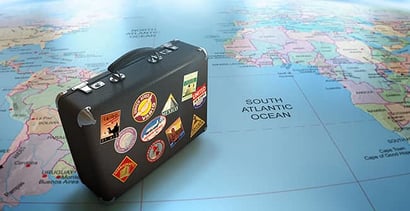

Americans love to travel. Whether it’s hopping in the car for a weekend at the lake or boarding a flight to head overseas, travel seems to be a favorite American pastime.
According to the U.S. State Department, nearly 110 million Americans hold valid passports. Around 17 million of those passports were used to travel internationally last year alone.
But with travel comes some amount of risk.
Whether you are traveling within the U.S. or abroad, take care to protect one of the most valuable possessions you have – your identity.
When traveling, we can sometimes become distracted and let our guard down; but that’s when identity thieves can take advantage. This guide will show you how to best protect your identity and stay safe when traveling.
1. Know what to carry and what not to carry.
You should never need to travel with your social security card, your birth certificate (even a copy) or your checkbook. Carry cash (in small amounts) and traveler’s checks.
Use credit cards too, as they are protected against fraud and theft.
2. Be aware of what’s going on around you.
Sure, the canals of Venice and the cathedrals of Rome are spectacular sights, but thieves and pickpockets know that too.
The easiest target is someone whose attention is diverted away from their valuables. A thief can grab a purse, wallet or bag and be gone within seconds.
3. Watch your electronic devices closely.
Many people travel with their cell phones or tablets, and even use them to take pictures. While it’s great to have those moments captured and stored, think about everything else you have stored on them.
If a thief were to grab your smartphone or tablet, what else would he have? Do you store account numbers and passwords? Do you have records that show your personal identity?
This is often the fastest way for identity theft to occur.
4. Take care when using ATM machines.
It is tempting to use a convenient ATM if you’re out and about, but remember one thing—identity thieves have been known to set up bogus ATM machines to capture your card information and PIN.
They can use this information to create duplicate cards and even access your bank account. Always use ATM machines that are part of a major bank building.
5. Do not use public Wifi for transactions.
It is tempting to take advantage of a free Internet signal to move money around or to check your account balances, but avoid the temptation. Public Wi-Fi signals can be high-jacked and your information easily stolen.
You should even avoid hotel Internet access for these types of transactions.
6. Do not forget the home front.
While you are traveling, your identity can be stolen from your home as well. Don’t advertise your travel plans on social media sites.
Also, consider letting a trusted neighbor know where you are and how long you’ll be away so that they can help keep an eye on things while you’re gone.
Traveling is one of the most enjoyable ways to spend our leisure time. By following the tips in this guide, you can make your trip safer and more enjoyable.
Stay aware and alert while you travel, whether it’s across the state or around the world.
Never underestimate the resourcefulness of identity thieves and what lengths they’ll go to in trying to steal your identity. A little awareness can mean the difference between a pleasant trip and a vacation nightmare.
Photo source: walldaz.com
Advertiser Disclosure
BadCredit.org is a free online resource that offers valuable content and comparison services to users. To keep this resource 100% free for users, we receive advertising compensation from the financial products listed on this page. Along with key review factors, this compensation may impact how and where products appear on the page (including, for example, the order in which they appear). BadCredit.org does not include listings for all financial products.
Our Editorial Review Policy
Our site is committed to publishing independent, accurate content guided by strict editorial guidelines. Before articles and reviews are published on our site, they undergo a thorough review process performed by a team of independent editors and subject-matter experts to ensure the content’s accuracy, timeliness, and impartiality. Our editorial team is separate and independent of our site’s advertisers, and the opinions they express on our site are their own. To read more about our team members and their editorial backgrounds, please visit our site’s About page.




